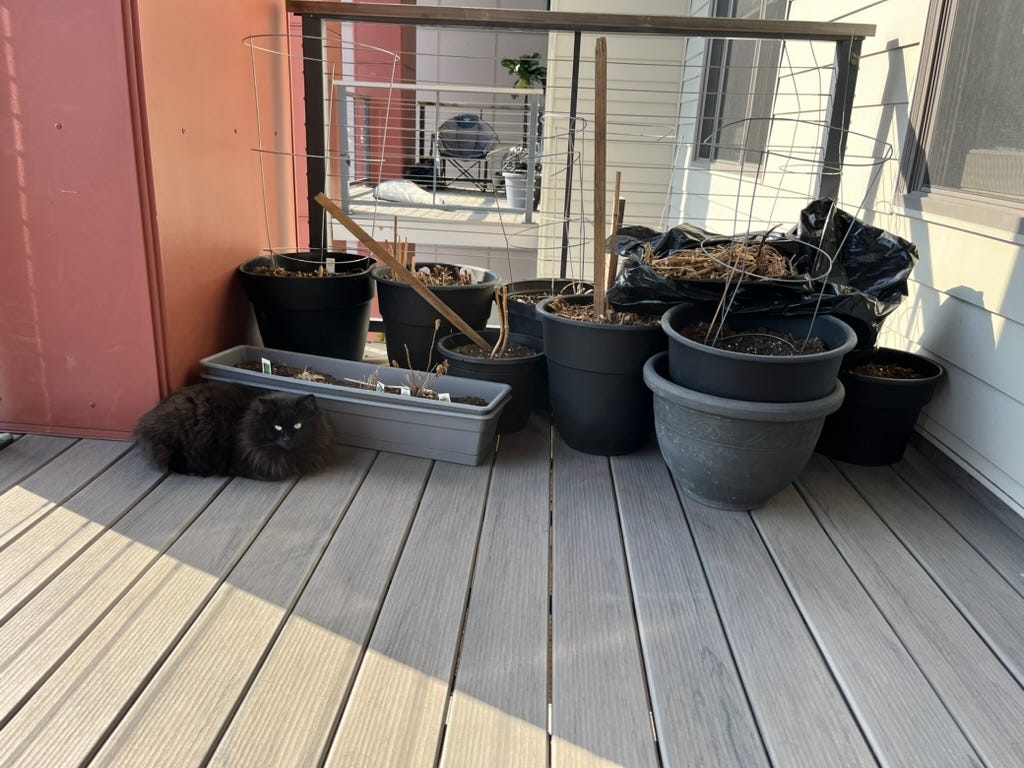Earn more, spend less, or invest better - what should you focus on?
Prioritize your weaknesses.
Earn more vs. spend less
Saving is the foundation of building wealth, and the two main ways to save more money are earning more and spending less. Let’s invent two people with opposite weaknesses.
Take Lump on one end of the spectrum: he earns hundreds of thousands of dollars each year, but has meager savings and relies on the next paycheck to pay his bills. He sometimes carries credit card debt and has no idea where all his money goes. He has an expensive car with ludicrous insurance premiums, but doesn’t really enjoy it. The payments on his vacation home make him doubt whether it’s worth two visits a year. Lump never shops around for better deals on his largest expenses. If this kind of person seems exaggerated to you, just ask Nicolas Cage how bad overspending on a high income can get.
“What is an octopus, $80? You’re not going to go into dire straits buying an octopus.”
-Nic Cage in a NY Times interview
Our second caricature is Pound, who makes $14/hr and is highly frugal. He tracks his spending in a spreadsheet and knows his average spending in each category. He frequently reviews what spending he might want to cut, shops at various stores to keep track of the best prices, and has multiple credit cards with high cash back rewards in various categories. Pound has a roommate to reduce housing expenses, keeps the temperature a little uncomfortable to save on utilities, and sometimes declines fun opportunities like restaurants and trips because of their cost. He owns a used Toyota Corolla and the A/C broke a year ago, but that’s fine. He occasionally considers selling his car to save money, even though public transport barely exists in his area.
Ask yourself, am I more like Lump or Pound?
If you’re a Lump, saving is your weakness. Earning more is not a solution right now, because if you get a raise or a bonus, you’ll probably find a way to spend it.
If you’re a Pound, you’ve neglected your earning power. You’re stuck in a zero-sum mentality where you have a fixed number of dollars, and your agency lies only in how you divide the pie between saving and spending.
Let’s say Lump is tired of spending all his money, and he’s really motivated to not be a Lump anymore. He could start tracking his expenses, either manually or with a budgeting app. That’s helpful for some people, but focusing on minor details is often a distraction. Stop buying organic bananas and you’ll technically save money, but bananas are insanely cheap. Most cuts will make you feel like you’re devoting effort to spending less, while barely changing your top-level numbers.
In my view, it’s most productive to focus on expenses that are large or recurring. Housing and vehicle expenses can be both large and recurring, which makes them juicy targets. Reducing one of those costs by 10% or 20% can easily make a greater difference than all of your banana-size sacrifices. You probably don’t need an expense tracker app to identify your leading expenses. But if your spending issues are due to an accumulation of many small purchases, expense tracking could help.
A Substack post is not going to fix anyone with a serious spending problem. This post is only about considering where to concentrate your efforts.
Cut to the next scene. One day Pound wakes up and there’s a magical feeling in the air: his budget is finally minimized. There’s not a single $5/month expense left to cut. Now he wants to focus on earning more. There are so many ways to make more money, but most of them boil down to a small number of approaches. Pound should consider cultivating:
A set of skills with persistent demand
Willingness to delay gratification while building skills and personal networks
Curiosity about the various ways high earners have reached their positions
Willingness to specialize in an unglamorous niche no one has heard of
Willingness to exert high levels of hard creative energy (e.g., sales)
Willingness to travel
Willingness to work longer hours
Willingness to work non-standard hours
Willingness to work in undesirable locations or conditions
Willingness to negotiate compensation
Willingness to change jobs
Pound doesn’t need to develop all of these. The top two alone have served many people well.
Read the last two again. Most organizations are hopelessly bad at retaining and rewarding good employees. As unpleasant as leaving a company can be, the mere readiness to take a risk and switch jobs can be a powerful driver of income growth.
I think most people would like to earn more money, and would be willing to put in some effort. But very few people have a concrete plan for increasing their income over the next five years. What skills would you need to learn? What would the best job experience look like? Are there helpful personal connections you could make? Are there certifications or other barriers to entry in your field that are associated with higher income? Is your current location suitable for the career you’d like to have? Is there a totally different career that you would consider? You can become so much more effective by asking questions like these and forming a plan. It doesn’t have to be detailed or insightful. Being curious and deliberate about moving your career forward puts you ahead of 99% of people.
—
Of course, spending less and earning more are both great ways to expand your capacity to save. A penny saved is actually more than a penny earned, because you get taxed on every penny you earn. But there’s a limit to how much spending you can cut. The ceiling is so much higher for those who focus on earning more, as long as saving grows alongside earning. The challenge lies in acknowledging your weakness, and seeking balance between the two extremes. Don’t be Pound or Lump. Be PLump.
Save more vs. improve your investing
Savings are the fuel for your investments. Whether you spend less or earn more — or inherit money or win the lottery — you have to save and invest that money to build wealth. The second component is your return on investment: how quickly does your portfolio grow? Combined with proper judgment, greater knowledge of investing can potentially lead to greater wealth. Let’s contrast another pair of people.
Odrade is 24 years old and has an investment portfolio of $12,000. She makes $50,000 annually in a junior position. If she improves her returns by 3 percentage points this year, she’ll be $360 richer! Nice, but not much compared to an earnings boost. If she can secure a $10,000 raise — either at her current company or by switching jobs — that would blow away any likely gain from spending more time learning to invest. And accelerating your early career has its own type of compounding return.
Lucilla is 60 years old and has $3 million in liquid assets. She earns a $100,000 salary in a senior position and would find it difficult to greatly increase her pay. If she improves her investment returns this year by 3 percentage points — either by increasing gains or reducing losses — she’ll be $90,000 richer. Expending effort on a 5-10% raise, or slashing a few items from her spending, would be less lucrative.
In other words, the ratio of Lucilla’s assets to income is high. Because Odrade is just out of college, her ratio is very low. Lucilla’s portfolio value is determined largely by its returns, while Odrade’s portfolio could still be growing noticeably with each paycheck.
At this point in your life, are you more like Odrade or Lucilla?
Let’s say you’re like Odrade. There are good reasons for people who haven’t accrued much wealth to understand finance. If Odrade buys a whole life insurance policy when she starts working, she’ll be locked into a wealth-draining scam that she can’t easily exit once she’s read the White Coat Investor posts. Her lowest-earning years are the best time to contribute to Roth retirement accounts, and she wouldn’t want to remain ignorant of that for long. But for Odrade at age 24, it’s not the best use of her evenings and weekends to master every nuance of personal finance. She should do that gradually, while sustaining focus on the main driver of her wealth: earning power.
What about Lucilla? If she hasn’t already, she would be well-advised to learn broadly about investing, tax planning, and other aspects of finance, including the psychological challenges of managing a large portfolio. Of course, some people choose to outsource many of those details to a financial advisor, which is a valid approach.
Lucilla could also become a hardcore stock picker or options trader, with the hope of improving her performance. We’ve discussed why most people should avoid making highly active investment decisions. The best investors are rarely those with extraordinary short-term returns: they’re mostly composed of people who have a steady approach and avoid commiting grave or repeated errors.
Okay, but what if you’re pretty sure that you’re great at researching investments? That you can outperform passive alternatives without eventually crumbling under the latent risks of your ten-stock portfolio?
In a previous post, we defined opportunity cost as
the implicit cost you accept by forgoing alternatives. If you spent an hour scrolling on social media, you could’ve spent that hour walking outside or reading a book made of paper or socializing with 3D people in real meatspace. The opportunity cost is the difference between what you actually did and the best alternative.
If you spend hours each month researching your own portfolio, it’s possible that it will be better off due to your management. But even if that’s true, consider what else you could’ve done with that time and energy. You could have used it to make more money directly, or to work on skills that are likely to increase your earnings in the future. Or to just relax and have a nice life.
But wait! Maybe you enjoy portfolio research. It can be fun, for some people, to read business news and 10-K filings. Is it possible that stock research is on the efficient frontier of the best way to spend your time, combining enjoyment and potentially greater wealth? Maybe. But here comes opportunity cost again: is it the most enjoyable use of your time? And how much stress would it add to your everyday life to know that your financial future rides on your stock selections?
On the other hand, you could just buy stocks based on general market chatter and not research them, which is a real strategy some people pursue with their real money.
For most people, I suggest that if you have that itch for active investing, throw some money in a separate brokerage account and buy your favorite stocks. Stay serious in your main investing accounts, and contribute enough to meet your core goals. Have fun in your fun account! But don’t rely on those investments for your future needs.
A simple conclusion
People feel comfortable working within their strengths. That might be minimizing spending, or setting up their investments just right. But if you’re great at X, your energy is not best directed by squeezing a little more benefit out of X. When there’s no juice left, do some Y instead.
See you next week.
Further resources
Every Money IRL post is organized in The Omni-Post, and all vocab terms are here.
Patrick McKenzie has a rousing guide to salary negotiation here. He’s a great follow on Twitter/X @patio11, has a podcast called Complex Systems, and writes a newsletter on the inside baseball of banking and finance called Bits about Money.
Ramit Sethi has a great video on building your own path to a raise.
Nic Cage’s 2019 interview with The New York Times Magazine has more good quotes than I could justify including in this post.
We have a post on automating your financial life, which can help with saving and investing more, as well as freeing up your attention to focus on more important things.
—
We love comments here. Tell us what you like or dislike, agree or disagree with. Recall a long story barely related to this post. Ask a question!
Please send photos of your pets if you’d like to see them in future posts. Or suggest a new topic, or say hi! You can email or tap the message button. Stay safe out there.
Email: bright.tulip711@simplelogin.com
—








Best article so far! Really good, thank you!
This was really helpful as I move to a new level in my career. Thanks for posting!